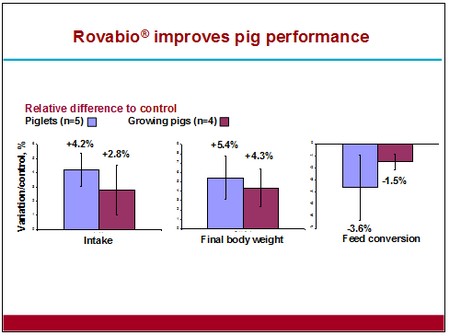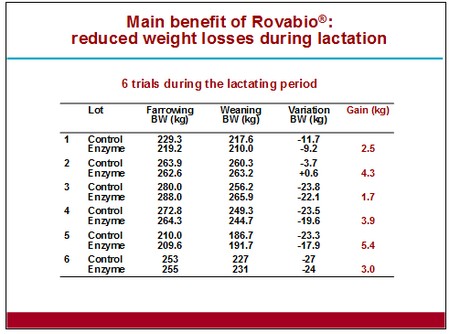Adisseo Swine Conference focused on the interest of NSP enzymes for pigs
Published: June 4, 2012
By: Adisseo Group
Before the "Journées de la Recherche Porcine", Adisseo organized its first Swine Conference in Paris on February 6th.
Over 50 nutritionists from Europe and Brazil attended the meeting.
First, Pierre Cozannet, Adisseo Enzymes Research Manager, reminded the audience of the numerous effects of fibers on pig nutrition and, consequently, on performances: decrease of feed intake, impact on intestinal transit and nutrients digestibility. He also described their positive effects on the intestinal bacterial flora.
Then Estelle Bonnin, INRA-Nantes Researcher, described how complex and variable grain structure and walls are, particularly those of wheat. Hence the necessity to understand enzyme (xylanases, beta glucanases, furanosidases and other cellulases) specificities and mode of action, and their combined effects on complex feed ingredients.
Following these presentations, Pierre Dalibard, Adisseo Global Technical Manager, showed a broad summary of in vivo and in vitro trials, identifying the effectiveness on pigs and also on sows of Rovabio®, a combination of 19 NSP enzymes. The bibliography shows that, whatever the substrate, and therefore the type of feed, NSP digestibility is improved thanks to enzyme combinations.
Publications have shown the positive effect of NSP enzymes on the intestinal villi and crypt depth of weaned piglets' intestines, which enables a better absorption of nutriments. Moreover, the bibliography shows an improvement of the ileal and fecal digestibility of all nutrients included in complete feeds (starch, fat, proteins, fibers, etc.) especially in the ileum. These results were confirmed by in vivo tests performed by Adisseo on cannulated pigs. Thanks to Rovabio®, the ileal and fecal digestibility of the energy and protein of wheat, barley and distillers is significantly improved. Trials have shown that the improvement of energy and nitrogen digestibility is at least 2% for piglets and fattening pigs. This enzymatic combination can also be interesting from a prebiotic point of view, as it enhances the positive bacterial populations (microbiota) in the gut. This contributes to explain better performances : + 7% on the daily weight gain (DWG) for piglets and 2% for fattening pigs, with a reduction of feed conversion (FC) of respectively 4% and 3%, and a better homogeneity of the final body weights.
NSP enzymes are also interesting for sows which, as Pierre Dalibard says, "must not be considered as mere adult pigs", given that their reproductive and digestive functions are in competition. Six trials conducted on lactating sows have proven that including Rovabio® in feed leads to lower body weight losses during lactation, especially in first parity.
The company has submitted a dossier to the European authorities in order to extend its approvals to a 7th application lactating sows.


Source
Adisseo GroupRelated topics:
Recommend
Comment
Share

Would you like to discuss another topic? Create a new post to engage with experts in the community.








